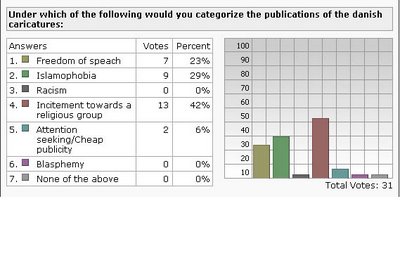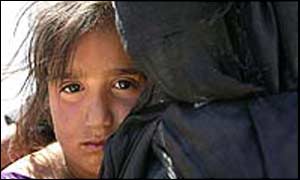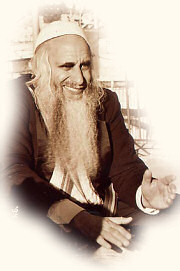| How to make a Shaykhspeara Sha'ira |
| Ingredients: 1 part success 5 parts humour 1 part ego |
| Method: Stir together in a glass tumbler with a salted rim. Add a little lovability if desired! |
Serving you topics featured in conversations over coffee and tea. Baal is the Arabic word for concern,thought & mind. It is also Urdu for hair.
March 31, 2006
Thirsty, anyone?
Poll Result: The Alchemist & "Swearing Citizens"

The idea of this poll came after seeing and hearing from people around me, that The Alchemist by Paolo Coelho is one of their favourite books, and also widely read it seems even by people who normally don't read that much.
The results I suppose give an indication but could also be misleading because perhaps people who haven't read the book won't bother to answer to the same extent as people who have read the book would.
Do vote in my next poll: "How often do you swear?" After reading an article on CNN's website about the increase of swearing amongst the average American I ask myself; are we living in an age of increased linguistic profanity?
"Neal, 26, who works with disabled adults, says she swears only in moments of extreme frustration, "like if someone cuts me off when I'm driving, or if I'm carrying something and someone shuts the door in my face."
Perhaps it is so that using the F-word has lost its initial meaning and become part of the contemporary slang? Still you see people using the word's "effing" or "f-ing" in replacement of the initial word itself. By doing so does one not imply that the word in itself is bad to use and thus one "masks it"? Why the self-censorship in that case?
"Younger people admit to using bad language more often than older people; they also encounter it more and are less bothered by it. The AP-Ipsos poll suggested that 62 percent of 18 to 34-year-olds acknowledged swearing in conversation at least a few times a week, compared to 39 percent of those 35 and older."
CNN also conducted a poll of their own on their website: Do you think swearing has become too common? 81 % answered YES out of a total of 64 357 votes.
March 29, 2006
Peter Sanders

 Many years back, at one of the youth conferences in Stockholm I attended, a British Muslim convert and photographer, Peter Sanders, graced us with his presence and photographic achievements.
Many years back, at one of the youth conferences in Stockholm I attended, a British Muslim convert and photographer, Peter Sanders, graced us with his presence and photographic achievements.A man who took photos of The Rolling Stones at one point in his career, only to now travel the Muslim world and capture its essence, its people and its soul.
He recently had an exhibition in Dubai called Salam in The City. The exhibition I saw, In the shade of the tree, had one particular image that stayed with me. And since words often have a tendency to fall short, I shall leave you with the image that to me represents the simple nature of Islam and the relationship between God and mankind.
Man praying in a mosque in Egypt
The word 'Allah' carved on a stone wall
All pictures copyright of Peter Sanders
Truth, I recognize you not

Truth, I recognize you not,
your footsteps are like those in sand.
Once made and soon to be forgot,
blown away by time's fickle hand.
You call to me but I hear naught,
though you stare me in the eye.
One cannot find what wasn't sought,
doomed yet again, to pass me by.
Oh truth I wish I'd know your face,
unveil yourself to my caprices.
They keep me tied up by a lace,
that's made up of my darkest vices.
Oh Truth I recognize you not,
how I wish I'd know your face.
You call to me but I hear naught,
untie me from my trapping lace.
Muslim conference in Sweden
 Every year, Young Muslims of Sweden (SUM), organizes a youth conference for Muslims in Scandinavia. This year the conference will be joined by among others Shabbir Ally, who hosts an interfaith program on Canadian Television. The theme of this year's conference in Stockholm between the 14th-17th of April will be: "Islam- A conscious way of life".
Every year, Young Muslims of Sweden (SUM), organizes a youth conference for Muslims in Scandinavia. This year the conference will be joined by among others Shabbir Ally, who hosts an interfaith program on Canadian Television. The theme of this year's conference in Stockholm between the 14th-17th of April will be: "Islam- A conscious way of life".
March 28, 2006
Thought of the day
Let us look at two ahadith (prophetic sayings/traditions):
1. Utlub al 3ilm wa law bil Seen
Seek knowledge even if it means going to China.
Have you seen a nation that produces more doctors? A nation more zealous in their attempts to at any cost, become doctors. Even if it means going to Latvia, Poland or the Caribbean because getting into those Universities is easier. They are yet to go to China but I am sure they are working on it as well.
2. Al jannah ta7t aqdaam al ummahaat
Paradise lies below the mothers feet.
Now I know all women married to Pakistanis are nodding their head in agreement, those of you who don't follow, let me explain.
No matter if you are a praying or practicing Muslim in Pakistan, there is not a single soul that doesn't know of this hadith, and there is not a single mother who hasn't pulled this one out on her kids, let's say just before her son (we will call him Omar) brings home a girl he wishes to marry.
Son (Omar): Ammi (mom), I want to marry Nadia, she is from the same city as Grandma. Her father is a DaaaaakTarrrr (Doctor), and her mother... (who am I kidding, they never care what the mother does).
Mother: Beta (son), does she understand our ways? Will she take care of me when I'm old, hah? Beta, where is jannat (paradise)?
Son: Under your feet ammi.
Mother: Shabash beta, shabash (Well done, son, well done).
In other words, Drop it!
And so the Nadia story ends. Naturally nothing was really wrong with Nadia, and she would probably take care of his mom and massage her feet and make her lassi (a drink made of yoghurt), it is just so that his mom didn't choose her and therefore, well, need I say more?
So then in case number two, where the son actually has gotten married to a girl, we will call her Shazia, next scenario takes place. Shazia who is a fairly "modern" girl in terms of being educated and all that, and coming from a home where her mother had to live with her in-laws, Shazia knows of the drama that follows with such a family set up and is keen to have a place of her own with her new husband:
Shazia (on the honey moon): Omar jaan (dear Omar), when we come back from Singapore (everyone goes to Singapore), we will have a separate living, right?
Now the answer will be one of the following possible two:
1. No, paradise lies under mom's feet.
2. Yes, you will have a separate living.
The outcome of both answers however is quite startling.
Let's say Omar replies with a "No". Shazia will of course be disheartened and with heavy steps return back to Pakistan, enter her new home with her mother in law standing by the door greeting her son with open arms. They will have every single meal together, every single day spent together.
Now what if Omar had said "Yes". Shazia would have been thrilled, and relieved, wouldn't she? With lighter steps returning back home, sitting in the car with her husband, smiling, excited about the new house they are moving into. They drive and drive, and finally stop in a neighbourhood that looks very much like that of her in-laws. "They all look the same", she thinks to herself reassuringly.
They step out of the car, Shazia eyes her new house, it looks exactly like her in-laws house, number on the door is slightly different. As they are about to enter, from across the street, a huge crowd is now gathered in the house opposite theirs.
Picture it, mother in law in her shalwaar kameez (Pakistani dress) with a plate of methai (Pakistani sweets) in her hands, smiling exaltedly, father in law just standing there, poor thing has no say anyway, children and grandchildren all over the place, all waving, and welcoming the arrival of the new neighbours Shazia and Omar.
The beauty of this house is, besides the fact that it's across the street from his mother, both kitchen windows stare each other straight in the eye so one can simply stand in it and look into the other house and wave.
Shazia: Omar?? yeh kya hai? (what is this). You promised me separate living?!
Omar: Arre Shazia, yeh to separate hai? Hum aiki ghar mai nahi rehte hai? (Shazia, this is separate? We aren't living in the same house are we?)
Shazia: Kya bakwas hai! (what a load of crap)
Omar: Shazia jaan, jannat kahaan hai? (Shazia dear, where is paradise?)
Note: Oh and by the way, these stories took place outside of Pakistan...
March 27, 2006
Muse of Self
oh Muse of Self the tunes you sing.
Numbing my senses with your cure,
what ailments you are sure to bring.
An oasis in the midst of my desert heart,
I quench my thirst with an illusion.
You are the master of your art,
of wrapping me up in my confusion.
Oh Muse of Self the tunes you sing,
persuading me to your wishes dance.
A happiness you pretend to bring,
come forth release me from this trance.
Muslim Stand Up!
 Azhar Usman, an American Muslim lawyer part of the Allah Made Me Funny crew brings Muslim stereotypes to light in a hilarious way. Watch a video clip here.
Azhar Usman, an American Muslim lawyer part of the Allah Made Me Funny crew brings Muslim stereotypes to light in a hilarious way. Watch a video clip here."He's been called the Ayatollah of Comedy, and lately people have been calling him Bin Laughin. Whether the audience is Muslim or not, young or old, serious or laid back, Azhar Usman's standup comedy is sure to please."
-Allah Made Me Funny
March 22, 2006
Orphan?
do you see her, father, what is she looking for?
I held your hand but you pulled it away,
I mourn the loss of you everyday,
though you are still breathing.
There are many words she could never say,
do you hear them, father, don't turn away.
I would cry at night with a broken soul,
and though you lost yourself and all control,
I was willing to find you.
Yet she grew up into a headstrong girl,
do you know her, father, are you part of her world?
I can't look you in the eyes anymore,
though my tears have dried my heart's still sore.
You are slowly dying.
There was a little girl standing by your door,
you never saw her, father, she's not there anymore.
March 21, 2006
Pakistani Aunties & Uncles
Being a half Swedish/Pakistani growing up with two cultures in one home, I suppose the "pakiness" of my father was somewhat moderated by the presence of my Swedish mother. Having said that, I was of course not spared entirely, for besides my father, every daughter of a Pakistani knows, that her business and her life is every Pakistani Aunty & Uncle's business.
I find that there is a strong cultural peer pressure, that leads the parents of such cultures into acting and saying things they normally perhaps would not be so passionately against. An example:
A few years back I was on my way home from work, and I suppose it was a bit late after ten or so (anything after 4 pm is late in their eyes), and I was walking with my Swedish colleague, a girl, mind you. When I reached home (and this is how fast the A's & U's work), dad had received a phone call from one of his friends who got him all worked up. Question is, if he himself had any idea why he was all worked up?
Dad: "Where have you been?"
Me: "You know where I have been, at work?"
Dad (uneasy and agitated): "Yes I know, but you were with a blonde girl!"
Me: "Umm, yes? and Mom is blonde too. Who told you anyway?"
Dad (increasingly annoyed): "Uncle so and so called me up and told me that you were walking with a blonde girl."
Me (unable to grasp what his point is): "Yes she is my colleague and what is the problem with me walking with a blonde girl?"
Dad (confused and not sure what to say): "Well, umm, don't talk back to your father!"
A classic remark. It is amusing however mind you, there are girls who are deeply affected by this mentality.
My dear friend had another incident involving her mother. She was out in town with her younger brother (he must have been 19 at the time), and they are very close and sometimes walk arm in arm together like siblings sometimes do. The moment she stepped through the door she found her mom in tears:
Mom: "Mera bacha (tr: my child), what did I do to deserve this?"
Friend: "Mom what's wrong? Who died?" (usually someone has died back home i.e. Pakistan, and even if it is the neighbor's dog, it is customary to feel upset.)
Mom: "Aunty so and so called, and she told me she saw you with a boy hugging! Aik larka ke saat! hay Allah maine kya ghalat kiya?!" (tr: With a boy! Oh God what wrong did I do?)
Friend: "What? What boy? When?"
Mom: "Jhoot mat bolo! (tr: don't lie) She said she saw you today and she called from her mobile phone."
Friend: "Mom, I was with bro the whole day?"
Mom (thrown off her Bollywood Drama act): "Don't talk back, I am your mother!"
So there we have it, the A & U News Network. I tell you, CNN cannot hold a candle to them.
Another hilarious story.
My friend, a half Pakistani/Swedish such as myself (mind you we have an even harder time since any wrong we do is blamed on our poor Swedish moms), moved to another city to pursue her studies at a university there. Nothing odd about that, right? Wrong.
After a few months she came back to visit, and had gained a pound or two, it usually happens, being homesick and all that, and she stayed a week and later on left. By this time, the A's and U's had spotted her near her home and naturally noticed the slight increase of weight.
Minds were now at work and rumor quickly spread:
A's & U's: "You know that girl, Aamir's daughter, she is pregnant! Yes, it is true. I saw her tummy. That's why she is living in another city. Haan, dekho, jab laug Swedish aurtein ke saat shadi karte hai to yeh hota hai." (tr: Yeah, you see, when people marry Swedish women, that's what happens).
There are so many stories, so many gems, but on a final note I leave with this last one (for now).
When I was 19 I decided to move to Syria (with a close friend of mine) to learn Arabic. Didn't really know anyone in Syria, besides one family that had previously lived in Sweden, nor been there before nor spoken a single word so it felt like it was pretty obvious that I am going there to study Arabic.
So I left, and came back to Sweden after 10 months. Like planned, I could now speak a bit of Arabic and read and write some. So, there was a Pakistani function of some sort held and against my will, I attended it. Of course all of the A's & U's were there just waiting to look at me, perhaps to see if a baby had popped out while I was gone (after all it only takes 9 months). And so I met with everyone and most of them don't know the difference between Syria and any other Arab country so most of the questions I got were:
"So how was it in Iraq?" "Did you like Algeria?" "Is Libya dangerous?"
Harmless, I thought. Not too bad after all. Till I sat down with a good friend of mine, who had the decency to be upfront with me.
Friend: "Shaykhspeara, there has been a lot of talk about your Syria trip, and I just thought you should know about it."
Me (bracing myself): "Oh really? Well thank you for telling me. What exactly has been said?"
Friend: "Well the Aunties said that you went to Syria because you wanted to marry some Syrian guy."
Rumor has it, ladies and gentlemen.
Poll Result: Danish Cartoons

It is interesting, although this poll does not really give an indication either way, how close the numbers are on Islamophobia and Freedom of Speech. Although a majority felt the publication was inciting towards a religious group, it seems that Freedom of Speech in this case has been equally understood as being Islamophobia. Two very different takes on the matter.
A poll with the title "Should an Australian newspaper publish the Prophet Mohammad cartoon?" was conducted on Australian National Nine News website, and the outcome really interested me if not baffled me.
A whole 96% of the voters answered No. (It should be added that the total number of people who participated in the poll was 243 354). A mere 4% said Yes.
I ask myself, what can be derived from this? Are the Aussies more understanding? Tolerant? Or are they scared of the possible aftermath? In that case, has Freedom of Speech become threatened? Or is it simply so that they have a different understanding of what Freedom of Speech is?
Don't forget to vote in the coming polls.
March 19, 2006
Naked Netherland Nonsense
On the schedule for immigrants who want to be future citizens of the Netherlands, the following will be found (besides studying 375 hours of Dutch in their previous country of residence):
- Watching a movie where homosexual couples are kissing
- Watching a movie starring a bare breasted woman (Right, so that will keep people away from the Netherlands?)
The Dutch Integration Minister Rita Verdonk explains, "(It) will implement Dutch liberal values in potential non-European immigrants. "
Leaders of immigrant groups however feel the film is nothing but a means to deter potential non-European immigrants (read: Muslims) from coming to The Netherlands.
I see, so European Russia saying no to the Pride march being held in Moscow does not count for intolerance against homosexuals?
BBC News covered the story a while back in an article saying Germany has implemented similar methods of "integrating" immigrants and have even gone so far as to have a special test aimed at Muslims. Here are some of the questions in the test:
How do you view the statement that a woman should obey her husband, and that he can beat her if she doesn't?
Umm even if the person asked was a wife beater, do they really expect him to say "that's correct."
Imagine that your son comes to you and declares that he's a homosexual and would like to live with another man. How do you react?
And last but not least my favorite
Some people hold the Jews responsible for all the evil in the world, and even claim they were behind the attacks of 11 September 2001 in New York. What is your view of this claim?
If this isn't "opinion registration", then I don't know what is.
March 18, 2006
Doha Debate on Extremism
Two members of the UN group, Archbishop Desmond Tutu and John Esposito, founding director of the Centre for Muslim-Christian Understanding, were among the four panelists answering questions from a student audience. They were joined by Hamza Yusuf, the US-based Islamic scholar, and Diana Buttu, former spokesperson for the Palestinian Authority.
-The Doha Debates
March 17, 2006
Coach Abdur-Rahman and The Lady Caliphs
March 16, 2006
War Child
 There is no sense of hope, nothing to make me smile,
There is no sense of hope, nothing to make me smile,no one to help me cope, to make things feel worthwhile.
A feeling of loss, a question, will peace return again?
When hate is the boss, all questions are asked in vain.
The days just go by, and the sun sets upon our perished land,
I find no reason to cry, I find no one to make me understand.
The thorns beneath, are covering the roads that lead to posterity,
They prickle my feet, and my trail of blood becomes my legacy.
March 15, 2006
A Jew, few knew
 I think it is fair to say that no other conflict holds such firm and fixated biases and prejudices on both sides as is the case with the Palestine-Israeli situation. No matter how open-minded a person is one tends to stick to common stereotypes and thus choking or even ignoring the voices that challenge us, that break the picture we painted up with great efforts and over a long period of time.
I think it is fair to say that no other conflict holds such firm and fixated biases and prejudices on both sides as is the case with the Palestine-Israeli situation. No matter how open-minded a person is one tends to stick to common stereotypes and thus choking or even ignoring the voices that challenge us, that break the picture we painted up with great efforts and over a long period of time.Rabbi Menachem is such a man. One to enter into our home of thoughts and rearrange it. I hope we all realize that there are important voices that stress the need to be objective and open-minded, but above all, open-hearted, in this painful conflict that has made lives even unbearable for many generations.
An excerpt from the article on Rabbi Menachem Froman as seen in the Telegraph:
For many religiously-driven settlers throughout the West Bank, any pull-out is a contravention of God's will that the land where they live belongs to Israel and the Jewish people.
They have already promised to put up fierce resistance to the planned eviction, repeating the bloody scenes that shocked Israel when police moved in to destroy just a few homes in the settlement of Amona last month.
But Rabbi Froman will not be among them.
"I am one of the founders of the settler movement," he said, strapping a tiny prayer scroll to his forehead. "But you can't claim to love the earth and not the people [Palestinians] living there."
March 11, 2006
The Bahá'í and Esperanto
 Reading about the constructed language, Esperanto, created by L.L Zamenhof and first published in 1877, really opened many other doors of thought for me. It is today the most widely spoken constructed international language, and it is thought that up to 2 million speakers in mainly Russia, China, Japan and Eastern Europe speak the language either as native speakers or as a second language.
Reading about the constructed language, Esperanto, created by L.L Zamenhof and first published in 1877, really opened many other doors of thought for me. It is today the most widely spoken constructed international language, and it is thought that up to 2 million speakers in mainly Russia, China, Japan and Eastern Europe speak the language either as native speakers or as a second language.The objective of L.L. Zamenhof was basically to create a language, that happened to be influenced by Polish, German, French and Russian, that would work as a unifying force and international second language. The thought is inspiring, for indeed often lack of communication is the basis of unsolved differences.
However reading on, one is automatically lead to the Bahá'í faith founded by Baha'ullah in the early 1800's in Iran. The idea of unity of humanity being of great importance to Baha'ullah, he speaks of an international auxiliary language, basically one language that will work as a second unifying language learnt by everyone in addititon to their native tongue, as a means to create peace and understanding.
Could L.L. Zamenhof have been influenced directly by the Bahá'í faith whilst developing the Esperanto language? After all, his daughter Lidia Zamenhof later became a member of the Bahá'í faith.
Baha'ullah himself names three languages that could work as that one unifying language, and Esperanto is one of them, along with English and Arabic. Today however mainly Persian and English is used as a means of communication on a wider basis among the Bahá'í followers.
Zamenhof wrote a poem called "La Espero" (The Hope), and it is today often referred to as the anthem of Esperanto. A verse from it leads:
Sur neŭtrala lingva fundamento, ---On a neutral language basis,
komprenante unu la alian, ---understanding one another.
la popoloj faros en konsento ---the people will make in agreement
unu grandan rondon familian. ---one great family circle.
It is interesting, this idea of one language unifying the world. One could argue that English already works as such a language, being very often taught as a second language at schools all over the world.
When it comes to Arabic, it can't be equated to the standing of English in terms of being a language that has the same demographic stretch. Yet, on the other hand, many Arabic terms that were derived from the religious connotations that they held, such as alhamdolillah, insha'Allah and masha'Allah, are used from Bosnia to China to Mexico and Kenya, by Muslims (practicing or non practicing), and native Arabic speakers of whatever ideological affiliation.
This function of Arabic (for more than a billion people), is something that is unprecedented, linguistically, anywhere in the world even though many might argue that English has achieved a similar function. The Bahá'í followers however, are yet to announce the unifying language of their choice that will work as the second language of the world however I have my bets on Esperanto.
For those of you who wish to see the language used in an everyday fashion, there is an interesting blog by an Arab Emirati called Samawel, who learnt the language by studying it online.
March 09, 2006
Muslims making the news in Sweden
1. The Swedish Foreign Ministry is sending three young Muslims, all familiar with the Arabic language, on a 9 day tour visiting the universities of Cairo, Suez and Amman. The trip according to our Foreign Minister Laila Freivalds, "is not a charm offensive. It is more serious than that. It is about bringing the issues to a more conscious level. There is a need for an exchange of experiences." The three Muslims, Nadja Jebril, Othman Tawalbeh and Hanin Shakrah all hope to be able to present a fairer picture of Sweden as opposed to the "anti-Islamic" perception of Sweden following the events in Denmark.
2. Police officers in Sweden are now officially allowed to wear a turban, headscarf or kippah whilst on duty after recent deliberations and discussions between the National Police Department and the Department dealing with ethnical discrimination.
3. At the grand mosque in Stockholm yesterday, a woman entered with her baby and left her to a lady in the prayer room saying she just had to get something and would be right back. The woman never returned. On the baby a note was attached saying she leaves the baby in the care of the mosque. Police still haven't heard from parents or relatives and the baby will now be placed in foster care with a Muslim family.
March 08, 2006
Baraka
Some of the shots are breathtaking and really inspire the traveler in you to go on a journey exploring this world that we so cherish and destroy. With scenes of destruction from post-war Kuwait to scenes of prayer and worship at Temples, Mosques and in nature all across the globe, you're taken to places you perhaps would never visit, for one reason or the other.
A highly spiritual journey that will undoubtedly strike a cord somewhere in your heart.




March 07, 2006
The Alchemist of Happiness
 Every religion and movement had its famous thinkers; Confucious, Aristotle, Nietzsche among many others. Ovidio Salazar, is responsible for bringing one of Islam's greatest philosophers on to the movie screen in his latest picture Al-Ghazali: the Alchemist of Happiness, and thus portraying the life of an ordinary man with an unordinary mind.
Every religion and movement had its famous thinkers; Confucious, Aristotle, Nietzsche among many others. Ovidio Salazar, is responsible for bringing one of Islam's greatest philosophers on to the movie screen in his latest picture Al-Ghazali: the Alchemist of Happiness, and thus portraying the life of an ordinary man with an unordinary mind."Exploring the life and impact of the greatest spiritual and legal philosopher in Islamic history, this film examines Ghazali's existential crisis of faith that arose from his rejection of religious fanaticism, and reveals profound parallels with our own times. Ghazali became known as the Proof of Islam and his path of love and spiritual excellence overcame the pitfalls of the organized religion of his day. His path was largely abandoned by early 20th century Muslim reformers for the more strident and less tolerant school of IbnTaymiyya. This film argues that Ghazali's Islam is the antidote for today's terror."
View the trailer here (high quality), here (medium quality) or here (low quality).
March 06, 2006
No, no, the men!
 Going to the mosque to say a prayer these days far from serves the object of the act i.e. to experience some sort of calm or peace in the "House of God". In our grand mosque in Stockholm, inaugurated in June 2000, Muslims from all over the world gather to say their prayers, attend lectures or classes, and go to work.
Going to the mosque to say a prayer these days far from serves the object of the act i.e. to experience some sort of calm or peace in the "House of God". In our grand mosque in Stockholm, inaugurated in June 2000, Muslims from all over the world gather to say their prayers, attend lectures or classes, and go to work.The building is the work place for many Muslim organisations that work within different spheres such as Islamic Relief, NewMoon, Al Khawarizmi (Swedish Muslim Student Association) and many more.
As for the history of the building itself, it calls for a separate post for it is a fascinating story.
Back to finding peace whilst praying in the mosque. I had a meeting with various organisations for the sake of discussing the material that should be included in a book that will be published in Sweden at the end of this year God willing about Muslim Peace Culture. We met in the office area of the mosque and the call for Asr prayer came so we all took a break to pray.
Now praying in a mosque in itself is not supposed to be a complicated affair. In our mosque the women's prayer floor is above the men's. However it is designed so that one can look down from the women's area straight to the men's in order to both see and hear what is going on better.
So the Imam calls out the adhaan (call to prayer) and one of the women goes and stands at the very front of the women's prayer room in order to start a line there. Very smart I think to myself, for that will allow plenty of room for people to come in from behind and make new rows should the amount of people increase. So I stand next to her and a few more women follow our lead.
An older woman, 55+ speaking Arabic comes to me and exclaims:
Laa laa, el rijaal! meaning no, no, the men!
I was startled for I did not quite understand what the men had to do with anything and furthermore the time for prayer was there and we were all trying to start. So she continues and pulls people telling them to move backwards in the room to the middle of it. I am still lost, but since everyone started taking a step back, I did not wish to pray solo for that sort of defeats the idea of congregational prayer.
This however, was still not good enough for the lady in question and at the same time another lady started joining in with different requests. Apparently we were not starting the line from the right side of the room. So she started pulling at people yelling yameen yameen (right, right) to move to the right whilst the other lady still calls out el rijaal!
By now I am fed up at the hen house our prayer room had turned into, along with many more around me and we were now in three different rows, one starting from the left, one from the right and one at the very back. It looked absolutely ridiculous. The woman came back to us again and now this time she was even more passionate about the rijaal so I had to ask her what she was talking about:
Hajjeh, ma fahimtek ya3ni sho da'7let el rijaal? meaning "Hajjeh (term of respect for an older woman), I didn't understand you, where do the men fit into all of this ?"
And she replied, as if it were the most natural thing I should have understood myself:
Ehna laazim naqif waraa el rijaal meaning we have to stand behind the men.
Behind? huh? we are in a separate room? They are not even in the room? What do you mean behind?
For a Muslim man or woman, the only person that one absolutely must stand behind, is the Imam. No one can stand in front of the Imam whilst praying. And our prayer room for women is designed so that the first row of the women is just behind the Imam, yet side to side (though on a different level in the building) with the men.
This woman meant that we should not even be standing next to the men praying one floor below us and she managed to rearrange the whole room of women into something that looked like abstract art á la Picasso, not only disrupting the time of prayer when silence and order should be in place but ruining the rest of my prayer for all I could think about during the whole prayer was how to tell her off in Arabic. So much for '7ushoo.
The incident stayed with me, not so much for disrupting my prayer which of course was bad enough but I thought to myself, she has probably raised kids, and along with that promoting an idea of men and women unto them which is far from anything one could call female emancipation. Women like her take us back to the days when women wore corsets and fainted at the sight of a man who most likely would be the only hope for financial security.
March 05, 2006
Tic TAG toe
-Four jobs I've had (waaaay back in the day):
1: Food taster (paid to eat new products and give my opinion on them)
2: Telemarketing (paid to talk bakwaas (i.e crap)
3: Hair & face model (paid to let someone comb my hair)
4: Burger maker at Burger King (paid to make burgers, very stimulating)
Only thing left is being paid to sleep, but I am working on it.
-Four movies I could watch over and over:
1: Scarface
2: Life is beautiful (La vita é bella)
3: Godfather I
4: Julius Caesar (with Marlon Brando)
-Four places I've lived in:
1: Peshawar
2: Damascus
3: Stockholm
4: Eskilstuna
-Two TV shows I like:
1: McLeod's Daughters
2: Prison Break
-Four places I've been to on holiday:
1: Dublin
2: Rome
3: Petra, Jordan
4: Cairo
-Four favorite dishes (what do you mean only four?):
1: Lasagna
2: Fatteh
3: Warak 3enab
4: Kabseh
5: Pancakes with whipped cream and fresh strawberries
6: Bruschetta with Mozarella, tomato and basil
7: The pizza made at Da Bafetto in Rome
8: Samosa (Pakistani style of course)
9: Tsabhe with Injeera (Eritrean foods)
10: Samboosa (Somali style)
11: Sushi (salmon and avocado)
12: Tabbouleh
13: Manaeesh with zeit wo zatar
14: Sammoun bi jibne wo banadora
That will do for this time.
-Four sites I visit frequently:
1: Wikipedia.com
2: MuslimHeritage.com
3: Aftonbladet.se
4: Google.com
-Four books I've read:
1: The Prophet by Kahlil Gibran
2: Very Good, Jeeves by P.G Wodehouse
3: Twelfth Night by William Shakespeare
4: Ihya 3oloum ad-deen by Al-Ghazali
-Four (as if) bloggers that will be tagged with this:
1: Destitute Rebel
2: DaveNC
3: Human before Jewish
4: Farrukh
5: Kaya
6: Dilligent Candy
7: MD
March 02, 2006
Eberhardt "On Women"
In her chapter, Reflections in a courtyard, Eberhardt talks about the ever so contemporary issue of women. I was surprised at her ideas and thoughts, though 100 years old, it seems we still ask the same questions, regardless of emancipation and equality. In the following quote, keep in mind Eberhardt is disguised as a man and just entered a courtyard in Bechar, Morocco.
"I entered into their midst and sat down in a corner of the courtyard. They didn't even notice me. Of course, there's nothing remarkable about me. I'm able to pass everywhere completely unobserved, an excellent position to be in for observing. If women are not good at this, it's because their costume attracts attention. Women have always been made to be looked at, and they aren't yet much bothered by the fact. This attitude, I think, gives far too much advantage to men."
So what do some Arabic proverbs say on observance?
Absar min Zarqaa Al Yamama, which means, more observant than Zarqaa Al Yamama, who apparently was a woman famous for her good eye sight.
Absar min al watwaat, which means more observant than a bat.
The question is, do women face the same predicament today? Are they made to be looked at and if so, by whom? Do they themselves contribute to it whilst being, like Eberhardt said "not yet much bothered by the fact", or is it imposed on them unawarely?

